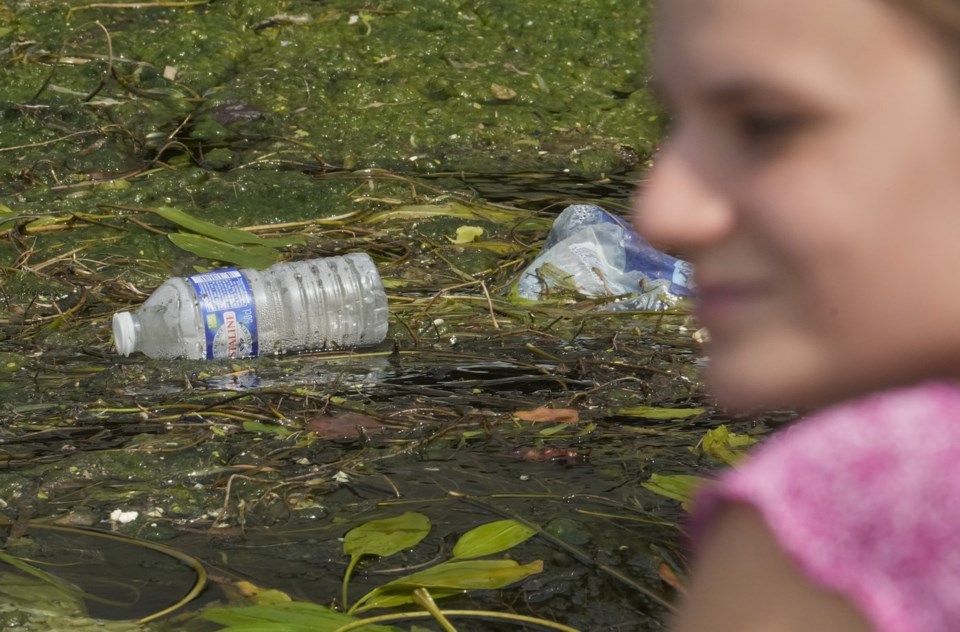OTTAWA — Canada is pushing to bring language recognizing the rights of Indigenous Peoples back into a United Nations plastics pollution treaty.
Delegates from more than 170 countries are in Geneva this week and next to resume negotiations on a treaty which was supposed to be finalized last year in South Korea. The meetings in Busan were to be the fifth and final round of negotiations to develop an international, legally binding treaty to end plastic waste by 2040.
Scientists estimate more than 350 million tonnes of plastic are thrown out every year. Less than one-tenth is recycled and more than one-fifth ends up in the environment, where it is harmful to people and all forms of nature.
Canada was instrumental in bringing countries together to discuss a treaty and hosted the fourth round of talks in Ottawa in April 2024.
But countries are at odds on how far the agreement should go, with many nations opposing caps on plastic production.
Reuters reported Wednesday the United States was circulating a memo to other countries this week, urging them to reject a treaty which placed limits on plastic production and plastic chemical additives.
Canada was among 100 other countries who signed a resolution in South Korea in November committing to future discussions on a global target to reduce plastic production to sustainable levels.
Following negotiations in South Korea, which ended without an agreement, the draft version of the treaty removed references to the UN Declaration on the Rights of Indigenous Peoples, or UNDRIP.
"My guess is they were just trying to streamline the (draft) texts as far as possible and get out any sources of disagreement in there," said Karen Wirsig, the senior program manager on plastics with Environmental Defence, a Canadian environmental advocacy organization, who is in Geneva observing the negotiations.
"I mean, it's just shocking given that there's the UN Declaration on the Rights of Indigenous Peoples. This is a UN process and you're gonna strip out all references to the rights of Indigenous people? Like, wow, shocking."
Canada presented a proposal Tuesday to put UNDRIP language back in to the treaty.
"Really happy to see it go forward; to have been involved in the process and then to see Canada put it forward for all parties to consider," said Kelsey Scarfone, a senior policy adviser with the Métis National Council who is part of the Canadian delegation in Geneva.
The Assembly of First Nations, and the Inuit Circumpolar Council are also on the ground advising the Canadian government in its negotiations.
Scarfone said the Canadian government officials have been "collaborative and supportive" in bringing the UNDRIP language back to the negotiating table.
"It's a very important position to get out there and build support on because Indigenous peoples' rights must be protected and affirmed in this treaty," Scarfone said.
"We just hope to see that carried through to the final hours of the negotiations."
Indigenous leaders observing the negotiations say they're fighting hard to assert their rights, and not just be lumped into any other group requiring consultation.
"We're the rightsholders. And unfortunately, we continue to be confused with stakeholders and observers in the (UN negotiation) process," said Tori Cress, the co-chair of the International Indigenous Peoples forum on plastics, and a member of the Beausoleil First Nation in Ontario.
Canada's proposal was backed by 45 countries, including Australia, Mexico, Panama, Colombia and Guatemala, along with a group of small-island nations.
In 2020, Canada produced more than 7.1 million tonnes of plastic and only five per cent of it was recycled material. Almost five million tonnes of plastic ended up as waste, with less than 10 per cent of it recycled.
While plastic can be broken down to microscopic levels, it never completely dissolves and can get into soil and water supplies.
This report by The Canadian Press was first published Aug. 6, 2025.
Nick Murray, The Canadian Press




